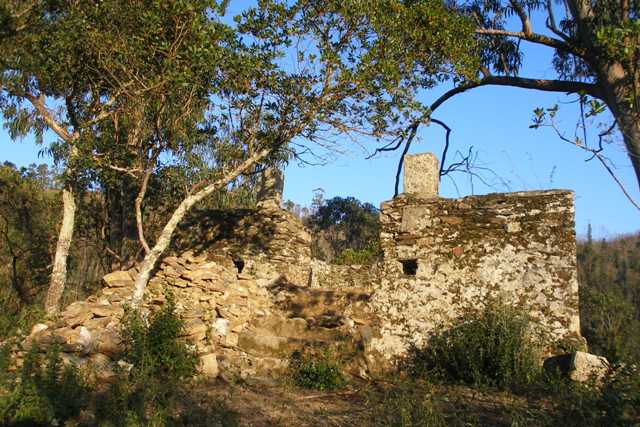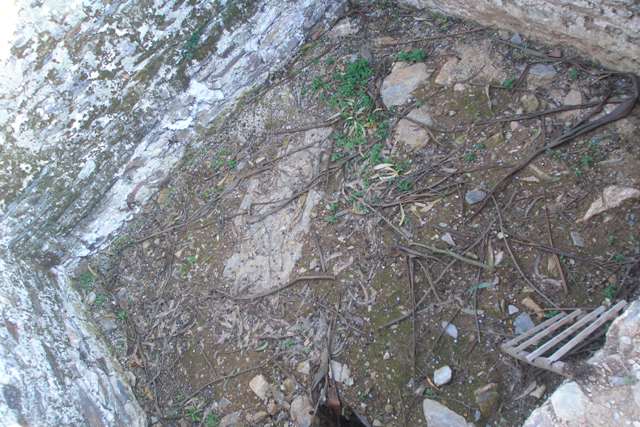
PT:
Castelo dos Mouros (Aguiar de Sousa)
“O castelo de Aguiar de Sousa situa-se ao lado do rio Sousa
instalado numa elevação que um dos seus meandros quase cerca. Está
na margem direita do rio, junto da antiga ponte e velha passagem. É
um monte cónico relativamente baixo, em comparação com as serras
que o circundam, mas cuja posição e a forma lhe permitiam fáceis
arranjos defensivos e assegurada defesa. Geologicamente é uma
elevação em xisto, perto de grande falha, que as águias que lhe
deram o nome, outrora povoavam.
A parte superior, escutiforme, com direcção NW-SE, deve ter sido
aplanada. O seu comprimento não é superior a 25 metros e a largura
máxima, na parte média anda pelos 11 metros. Neste espaço cimeiro
haveria uma construção adaptada a área cujos alicerces são ainda
visíveis. A base da pequena torre “com sólidas paredes fortemente
argamassadas” é obra muito recente e datará das comemorações da
Restauração, em 1940, como fragmento em mármore sugere. Havia pois
uma construção com a forma de quadrilátero, irregular, que vista de
baixo poderia sugerir uma torre. O aceso a esta parte alta fazia-se
por um íngreme carreiro, do lado NW segundo uma solução muito
frequente em castelos desta região por onde os atacantes
dificilmente poderiam subir e onde facilmente se expunham aos
arremessos dos defensores. Na parte média do monte, lado ocidental,
onde se instalam, hoje, uns pequenos socalcos parece ter havido
também um declive com muralha defensiva”."(1)

"Todo este território, centro administrativo de um extenso
julgado, foi tomado por Almançor em 995. Mohamed Almansor, Almançor
ou Al-Mansur, consoante os autores,(939-1002) foi regente do reino
de Córdoba e famoso capitão dos mouros de Espanha. Tendo sido o
mais célebre chefe Muçulmano da Península Ibérica dominando os seus
destinos desde 976, empreendeu 52 campanhas contra os cristãos da
Península Ibérica tendo saído vitorioso de todas elas.
Em 985 tendo conquistado Barcelona, destruiu-a pelo fogo; em 987,
conquistou Coimbra e, 10 anos passados, em 997 chegou a Santiago de
Compostela, cujo templo destruiu.
Conta-se que terá morrido de desgosto por ter sido derrotado na
batalha de Calatañazar pelos reis de Leão, de Castela e de
Navarra.
São várias as crónicas que aludem às campanhas de Almançor no
Castelo de Aguiar de Sousa, tendo sido neste local que este rei
mouro sofreu as suas maiores derrotas. A lápide aí colocada em 1940
tem a seguinte inscrição: “Junto das ruínas deste Castelo tomado
pelos Cristãos ao Almançor nos arrebois da Pátria, foram
comemorados o 8º Centenário da Fundação e o 3º da Restauração de
Portugal. Aguiar de Sousa-Paredes”."(2)
Procurem deixar a cache da mesma forma que a encontraram.
EN:
Mourish's Castle (Aguiar de Sousa)
; “The castle of Aguiar de Sousa places it the side of the river
Sousa. It is in the right edge of the river, next to the old
bridge. It is a relatively low conic mount, in comparison with the
mountin ranges that surround, but whose position and the form
allowed easy defensive arrangements and assured defense.
The superior, with direcção NW, must have been levelled. Its length
is not superior than 25 meters and the maximum width, in the
average part, about the 11 meters. In this highest space the area
would have a suitable construction whose foundations are still
visible. The base of the small tower “with solid walls” is
workmanship very recent and it will date of the commemorations of
the Restoration, in 1940, as a break up in marble suggests. It had
therefore a construction with rectangular form, volunteer, who seen
of low it could suggest a tower. The lighted one to this high part
became for a steep path, of the side NW as a very frequent solution
in castles of this region for where the aggressors hardly could go
up e where easily they were exposed to the atacks of the defenders.
In average part of the mount, side occidental, where it is
installed, today, small stairs, seems that it ahd also a declivity
with defensive wall”." (1)
"All this territory, administrative center of an extensive
judgeship, was taken by Almançor in 995. Mohamed Almansor, Almançor
or Al-Mansur, consonant the authors, (939-1002) was regent of the
kingdom of Córdoba and celebrity captain of the mourish of Espanha.
Having been more Muslim head of the Iberian Peninsula celebrates
dominating its destinations since 976, they undertook 52 campaigns
against the Christians of victorious the Iberian Peninsula having
left all.
In 985 having conquered Barcelona, he destroyed it for the fire; in
987, she conquered Coimbra and, 10 years passed, in 997 arrived to
the Santiago de Compostela, whose temple has destroyed.
It is told that it will have died of disgust for having been
defeated in the battle of Calatañazar for the kings of Lion, of
Castile and of Navarrese. < br> There are several cronicles
that allude to the campaigns of Almançor in the Castle of Aguiar de
Sousa, having been in this place where this mourish king has
suffered its bigger defeats. The tablet placed there in 1940 has
the following registration: “Next to ruins of this Castle taken for
the Christians to the Almançor in the 'arrebois' of the Native
land, had been commemorated 8º Centenarian of Foundation and 3º of
the Restoration of Portugal. Aguiar de Sousa-Wall”. " (2)
Please, leave the cache as close as you found it :)
(1) REQUALIFICAÇÃO E REABILITAÇÃO DA TORRE/CASTELO DE AGUIAR DE
SOUSA - CENTRO INTERPRETATIVO, José Paulo Bettencourt
(2)
http://www.regional-editora.com/distritos/porto/paredes/historia/2_historia.htm